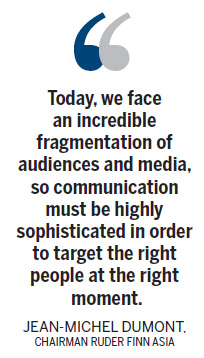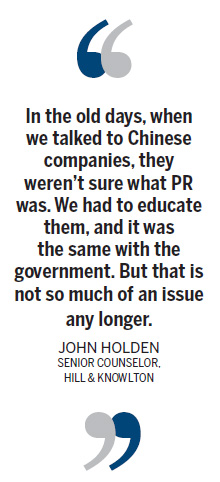Topspin
Updated: 2011-11-18 08:49
By Alexis Hooi (China Daily)
|
|||||||||

Foreign pR agencies faced with a nascent Chinese sector are scrambling to help 'manage' the country's development in the information age
|
||||
More than 20 million users of the Twitter-like Internet platform later took part in the rescue work, provided updates on the disaster and kept tabs on officials who were investigating it.
The event became one of the latest milestones in the effects of social media and its ability to provide and manage information as the country enters the digital age.
Unsurprisingly, China's social media is also becoming one of the biggest challenges for many public relations (PR) professionals - the people whose very careers depend on using that ability for their clients, most notably in times of crisis.
"The social media conversation and communities in China are so vibrant and so fast moving and importantly, so influential on the traditional media and on other key stakeholders of our clients. There is a social media conversation in China and there is also an audience watching the social media conversation happening," says Chris Deri, chief executive officer and market leader, China, for global PR and communications firm Burson-Marsteller.
The US-based agency first entered the Chinese market through a joint venture with the Xinhua News Agency in 1986. Burson-Marsteller now has offices in major cities including Beijing, Shanghai, Guangzhou, Chengdu and Shenzhen, with about 70 percent of its fees coming from foreign companies operating in China and the rest from domestic companies. Burson-Marsteller is also part of an industry where social media forms a significant area of the work, with players trying to keep up with the latest blog or post that can influence the direction of any event seriously affecting public or private stakeholders.
The importance of social media itself is just one major step in the evolution of foreign PR agencies in a young but fast growing Chinese market, major PR practitioners say.
The PR industry 12 years ago was still an "infant industry" in China, says David Liu, managing director, China, of global PR agency Weber Shandwick.
"It was not very sophisticated and not many people knew what it was about," says Liu, a 20-year PR veteran whose agency was also involved in Beijing's successful bid to host the 2008 Olympics and the Shanghai World Expo last year.
"In the past, you'd write a press release and organize a press conference. It was really very straightforward and you didn't need a lot of strategy," Liu says.

"But since 2003, we've seen very rapid growth of the PR sector in China. Following 9/11, the US was hard hit and the global economy was hard hit too. There was a sense that we needed another 'US' to support the global economy. A lot of foreign direct investment poured into China and the first thing that multinational companies did after increasing their investments in China was to expand marketing and PR.
"Big Chinese companies also started to realize the value of PR so they also increased their spending."
John Holden, senior counselor for US-based global PR agency Hill & Knowlton, says there was virtually no competition in the field when it begin operating in the Chinese market in 1984.
"There was a very small pie but there were very few people trying to eat it. Now it's a big pie and infinitely more complicated," says Holden, whose agency was used by the authorities to work on the 2008 Beijing Olympics.
"In the old days, when we talked to Chinese companies, they weren't sure what PR was. We had to educate them, and it was the same with the government. But that is not so much of an issue any longer. Chinese businesses now, like their foreign counterparts, all know that PR is an essential part of any marketing and communication efforts. So the industry is actually growing at a faster pace than advertising and at a faster pace than the gross domestic product (GDP). So there's a lot to do," he says.
"The other thing that has changed in a major way is the rise of digital communications, social media etc. And that's changing the rules for everybody. China is no different, it's keeping pace, in fact sometimes leading in the development of some dimensions of social media. So we have to stay very much at the forefront, at the cutting edge, the leading edge of these developments."
Scott Kronick, president, North Asia, at global PR agency Ogilvy Public Relations Worldwide, says the early days were about "multinationals coming in and trying to figure out what to do and what to say and how to build the brand".
"Multinationals reached out and said 'how do we effectively communicate and build long-term relationships with our stakeholders'?" says Kronick, who has been with Ogilvy for 23 years and oversees all of its operations in China.
In the late 1990s, many Chinese companies started to go public and everybody knew they needed a PR company because they knew they had to communicate, he says.
"So Chinese companies started to communicate with audiences outside of China. Then the marketing of organizations got more sophisticated," Kronick says, adding that the country's entry into the World Trade Organization, the run-up to the Beijing Olympics and the outbreak of the SARS epidemic were some of the major events that impacted the need for more communication.
The earthquake that hit Sichuan province on May 12, 2008 and its aftermath also helped change the landscape, Kronick says.
"With the earthquake and then the Olympics, every day people from all over the world saw China wasn't this country where everybody rode bikes and wore Mao suits. There was a different, more advanced country and perceptions changed. And really with the earthquake, you started to see Chinese companies starting to communicate more about their practices, their brands, and their CSR (corporate social responsibility) activities. Now the public relations industry is very much a part of the marketing mix."
Jean-Michel Dumont, chairman of Ruder Finn Asia, says most PR agencies in China 15 to 20 years ago were "mainly busy planning and implementing events but were seldom acting as their clients' strategic partners" but the situation today is "dramatically different".
"In 2011, good agencies operating in China have become strategic partners for their clients, providing high-value counseling, identifying the latest market trends and helping brands remain relevant to Chinese consumers and corporations to better engage their stakeholders," Dumont says. US-headquartered Ruder Finn has been in the Chinese market for more than two decades.
"Today, we face an incredible fragmentation of audiences and media, so communication must be highly sophisticated in order to target the right people at the right moment - for example, you have to be aware of how the 'post-80's' generation consumes information and adapts your style and content to their needs. Communication is also more brand-centered and less product-centered than in the past - every communication step can potentially strengthen (or damage) a brand."
Tim Dyson, the chief executive officer of major communications company Next Fifteen Communications Group, says the Chinese market currently makes up a fraction of the global PR industry, which is worth $7 billion (5.2 billion euros). But that is against the whole $700 billion-marketing industry.
"The transition that the whole PR industry is going through around the world is that actually the boundary between public relations and marketing is coming down. More and more companies because of online social channels are much more inclined to come to say 'how do you manage our reputation online' rather than 'can you manage our reputation in the media, can you manage our reputation with this user group' or whatever that might be," says Dyson, who heads a group with more than five independent subsidiary PR brands under it.
 |
"So budgets are becoming much more difficult to define and the pot is getting much bigger. That's the other opportunity that China has. In the same way that it is leapfrogging other industries, it can do the same for PR. In the Western style, the boundaries are pretty entrenched and people are fighting to keep them. But more progressive companies are trying to push them down and in China the opportunity is there to just ignore them completely and build completely new types of agencies that are far more broad in their scope and that are far more digital in their nature."
The Chinese public relations industry last year hit 21 billion yuan ($3.31 billion, 2.45 billion euros), growing by about 25 percent from a year earlier and is set to maintain that rate, with industries like automobiles, healthcare, IT and finance continuing to lead the charge, figures from the China International Public Relations Association show.
As with many other PR professionals banking on technology to drive the development of such sectors, Ogilvy's Kronick says the digital sphere will be a crucial area for targeted audiences.
"We have a whole team that does videos here. Why? Because people don't want to read anymore, they want to watch videos. I try to understand where people are and then I try to find the right channel, the right message to help clients communicate."
Kronick says his agency's "China outbound" work will also be a significant part of the industry's next stage in the growing Chinese market. "We set up a China outbound practice, which is helping Chinese companies build brands outside of China. When a Chinese brand goes global, there are all sorts of marketing and PR needs," says Kronick, whose group helped IT giant Lenovo carry out its global brand expansion, among other major accounts.
"There's a big desire for Chinese companies to go to Europe and the US," Kronick says.
The sector is also growing so fast that getting the right people to do the job is becoming increasingly difficult, Weber Shandwick's Liu says.
"There is a limited pool of talent. This has always been a challenge for all of us. Now it's not only the lack of a big pool of experienced PR professionals, but the higher costs required to acquire such talent.
"Currently, some of our local hires are more expensive than our colleagues in the US. This is the same challenge for everybody."
Despite the numerous opportunities being presented by the expanding Chinese market, many say the PR sector here also needs to overcome certain "bad habits" before it can evolve and get up to speed with global standards.
"The public relations industry is facing many challenges as it develops in the country," says Zhan Jiang, professor of communication studies at the Beijing Foreign Studies University.
"One of the major problems that remain is how PR companies deal with the media. Foreign and international PR agencies for example, are faced with several unethical habits that remain in the field, including paying journalists with cash for reports and the subsequent blurring of news and advertising or publicity for companies.
"As the market matures, PR practitioners need to seriously think about how these issues can be resolved. How do foreign PR agencies surmount these challenges and bring their best practices to the market but at the same time, compete with local agencies effectively?"
Chen Yujie, managing director, China, for PR Newswire, a communications company whose services include distributing press releases for clients, says one of the biggest initial challenges for the PR industry in China was how it could work with "State-owned media that got financing from the government agencies".
But the rapid expansion of the industry now means it is also undergoing a lot of changes with the general level of professionalism and sophistication improving, he says.
"The principles of doing PR are essentially the same. In China, for a long time, many people in the industry believed that the corporations or the PR professionals could somewhere 'control' the media and control the messages. That is no longer true.
"The fundamental principles are the same. We need to be transparent, we need to be honest and we need to be proactive in communicating with the audience. More importantly one can no longer 'control' the media, but learn to work, listen and interact with them. It's not a one way street anymore where you send out a press release and expect people to write about it."
The central tenets of trust, transparency and credibility also mean that the PR industry in China is not just about guanxi, or relationships, as many might immediately assume, practitioners say.
"Guanxi is not exclusive for China. That applies to other markets also," Weber Shandwick's David Liu says.
"If you have better relations with certain media, the guanxi helps you to deliver the story because they trust you."
"As a social psychologist trying to advise clients on what to do, you need to have good relationships with people that can give good, solid, credible information," Ogilvy's Scott Kronick says.
"Guanxi is important but it is overrated sometimes. It's not all about guanxi. You need to have good, sound judgment. Of course I try to work to build up my relationship network, but everything doesn't stem from just my relationships. It's much more sophisticated than that," Kronick says.
"Guanxi is always going to be a valuable part of our business whether it's in Beijing, Brussels or Washington," Burson-Marsteller's Chris Deri says.
"Relationships are always going to matter and we are always going to counsel our clients to manage and grow their relationships with decision-makers and also decision-influencers. But there's no 'silver bullet Rolodex' that is going to help a company achieve its business goals or manage a particular crisis. China's too complex."
|
From left: David Liu, managing director of PR agency Weber Shandwick, China; and John Holden, senior counselor of PR agency Hill & Knowlton. Feng Yongbin / China Daily Liu Zhe / China Daily |
|
Scott Kronick, president, North Asia, for global PR agency Ogilvy Public Relations Worldwide. Feng Yongbin / China Daily |

















